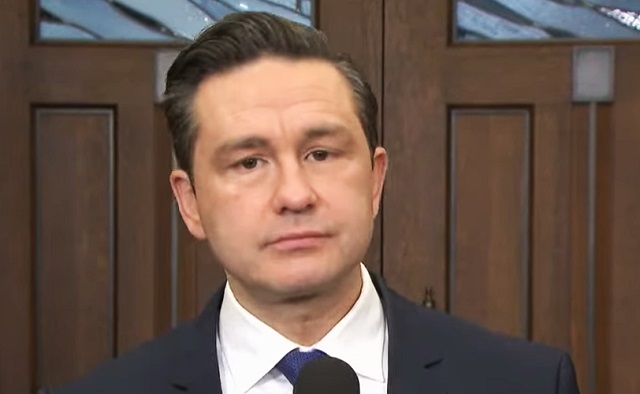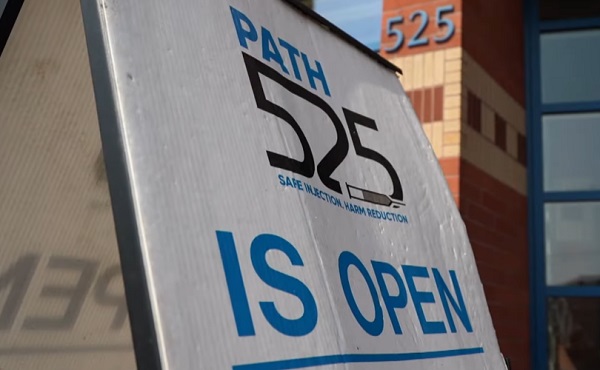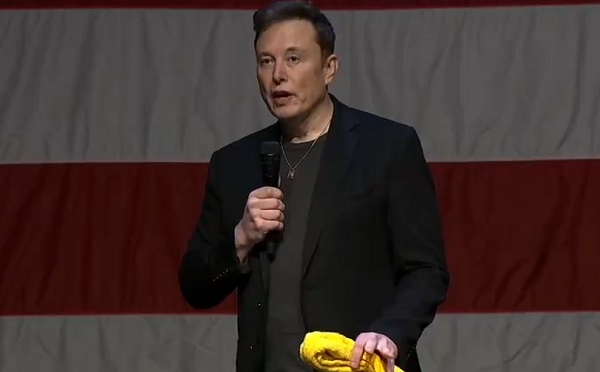Addictions
‘Drug dens’: Poilievre calls out Trudeau’s misleadingly named ‘safe’ injection sites

From LifeSiteNews
Pierre Poilievre haș again sounded off on the Trudeau government’s ‘safe’ injection sites and other drug measures, policies which have been followed by an uptick in drug overdoses wherever implemented.
Conservative Party leader Pierre Poilievre has condemned Prime Minister Justin Trudeau’s Liberal government and the mainstream media for concealing the failure of federally-subsidized “safe” injection sites for hard drug use.
During a July 12 press conference in Montreal, Quebec, Poilievre slammed politicians and mainstream media alike for masking the failure of the Trudeau government-led “supervised injection sites,” pointing out the misleading nature of the term “safe” often used when discussing these facilities, which allow addicts to abuse themselves by injecting deadly narcotics such as heroin.
“I know wacko politicians in the Liberals and the NDP [New Democratic Party] and their supporters in the media want to make it sound like there’s a constitutional obligation that we allow these drug dens anywhere they want to go up,” said Poilievre. “That is not true. That is the opposite of true.”
Poilievre’s remarks were delivered in a kindergarten playground near Montreal’s first federally-subsidized injection site that opened on April 15.
Poilievre promised that “there will not be a single taxpayer dollar from a Poilievre government going to drug dens.”
“Every single penny will go to treatment and recovery services to bring our loved ones home drug-free,” he added.
Poilievre further called out mainstream media reporters for repeating Trudeau’s claim that the drug sites are “safe” or “supervised.”
“What will you do around safe injection sites across the country?” Globe & Mail reporter Eric Andrew-Gee questioned.
“They are not safe injection sites, I’m sorry,” Poilievre responded, explaining that those terms are “dishonest language.”
“You guys repeat the same language you get from the radical Liberal-NDP activists and bureaucracy,” said Poilievre. “You call them safe. How can they be safe? Do you think it’s safe when a bullet comes flying out of one these sites to kill a mother in Toronto? Do you think that’s safe? Do you think it’s safe to have people using crack and heroin and cocaine next to a playground like this? Do you think that is safe? It’s not safe.”
Poilievre’s mention of the Toronto mother is a reference to the 2023 shooting death of Karolina Huebner-Makurat, a 44-year-old mother of two. Police allege Huebner-Makurat was killed by a stray bullet fired by a man in a drug-related dispute with another man outside of an injection site in the city’s Leslieville neighborhood.
In addition to injection sites, the Trudeau government has also been involved in the distribution of drugs to addicts. In fact, Health Canada recently noted that the Trudeau government has budgeted over $27 million in funding for “safe supply” drug programs that have been linked to increased violence and overdose deaths across Canada.
“Safe supply” is the term used to refer to government-prescribed drugs given to addicts under the assumption that a more controlled batch of narcotics reduces the risk of overdose. Critics of the policy argue that giving addicts drugs only enables their behavior, puts the public at risk, disincentivizes recovery from addiction and has not reduced – and sometimes even increased – overdose deaths when implemented.
The best example of the Trudeau government’s drug policy failures come from the province of British Columbia. Starting in 2023, the Trudeau government decriminalized the possession of up to 2.5 grams of hard drugs without criminal penalty.
Shortly thereafter, record numbers of overdose deaths and similar incidents occurred, leading to the province itself requesting that the Trudeau government recriminalize drugs in public spaces.
Nearly two weeks later, the Trudeau government announced it would “immediately” end the allowance of hard drug use in public, which critics see as tacit admission the policy was a disaster.
The effects of decriminalizing hard drugs have been the source of contention throughout the country, as evidenced in Aaron Gunn’s documentary, Canada is Dying, and in U.K. Telegraph journalist Steven Edginton’s mini-documentary, Canada’s Woke Nightmare: A Warning to the West.
Gunn, who has since become a Conservative Party candidate, previously noted that his film shows clearly the “general societal chaos and explosion of drug use in every major Canadian city” since lax policies were implemented.
“Overdose deaths are up 1,000 percent in the last 10 years,” he said in his film, adding that “every day in Vancouver four people are randomly attacked.”
Addictions
BC Addictions Expert Questions Ties Between Safer Supply Advocates and For-Profit Companies

By Liam Hunt
Canada’s safer supply programs are “selling people down the river,” says a leading medical expert in British Columbia. Dr. Julian Somers, director of the Centre for Applied Research in Mental Health and Addiction at Simon Fraser University, says that despite the thin evidence in support of these experimental programs, the BC government has aggressively expanded them—and retaliated against dissenting researchers.
Somers also, controversially, raises questions about doctors and former health officials who appear to have gravitated toward businesses involved in these programs. He notes that these connections warrant closer scrutiny to ensure public policies remain free from undue industry influence.
Safer supply programs claim to reduce overdoses and deaths by distributing free addictive drugs—typically 8-milligram tablets of hydromorphone, an opioid as potent as heroin—to dissuade addicts from accessing riskier street substances. Yet, a growing number of doctors say these programs are deeply misguided—and widely defrauded.
Ultimately, Somers argues, safer supply is exacerbating the country’s addiction crisis.
Somers opposed safer supply at its inception and openly criticized its nationwide expansion in 2020. He believes these programs perpetuate drug use and societal disconnection and fail to encourage users to make the mental and social changes needed to beat addiction. Worse yet, the safer supply movement seems rife with double standards that devalue the lives of poorer drug users. While working professionals are provided generous supports that prioritize recovery, disadvantaged Canadians are given “ineffective yet profitable” interventions, such as safer supply, that “convey no expectation that stopping substance use or overcoming addiction is a desirable or important goal.”
To better understand addiction, Somers created the Inter-Ministry Evaluation Database (IMED) in 2004, which, for the first time in BC’s history, connected disparate information—i.e. hospitalizations, incarceration rates—about vulnerable populations.
Throughout its existence, health experts used IMED’s data to create dozens of research projects and papers. It allowed Somers to conduct a multi-million-dollar randomized control trial (the “Vancouver at Home” study) that showed that scattering vulnerable people into regular apartments throughout the city, rather than warehousing them in a few buildings, leads to better outcomes at no additional cost.
In early 2021, Somers presented recommendations drawn from his analysis of the IMED to several leading officials in the B.C. government. He says that these officials gave a frosty reception to his ideas, which prioritized employment, rehabilitation, and social integration over easy access to drugs. Shortly afterwards, the government ordered him to immediately and permanently delete the IMED’s ministerial data.
Somers describes the order as a “devastating act of retaliation” and says that losing access to the IMED effectively ended his career as a researcher. “My lab can no longer do the research we were doing,” he noted, adding that public funding now goes exclusively toward projects sympathetic to safer supply. The B.C. government has since denied that its order was politically motivated.
In early 2022, the government of Alberta commissioned a team of researchers, led by Somers, to investigate the evidence base behind safer supply. They found that there was no empirical proof that the experiment works, and that harm reduction researchers often advocated for safer supply within their studies even if their data did not support such recommendations.
Somers says that, after these findings were published, his team was subjected to a smear campaign that was partially organized by the British Columbia Centre on Substance Use (BCCSU), a powerful pro-safer supply research organization with close ties to the B.C. government. The BCCSU has been instrumental in the expansion of safer supply and has produced studies and protocols in support of it, sometimes at the behest of the provincial government.
Somers is also concerned about the connections between some of safer supply’s key proponents and for-profit drug companies.
He notes that the BCCSU’s founding executive director, Dr. Evan Wood, became Chief Medical Officer at Numinus Wellness, a publicly traded psychedelic company, in 2020. Similarly, Dr. Perry Kendall, who also served as a BCCSU executive director, went on to found Fair Price Pharma, a now-defunct for-profit company that specializes in providing pharmaceutical heroin to high-risk drug users, the following year.
While these connections are not necessarily unethical, they do raise important questions about whether there is enough industry regulation to minimize potential conflicts of interest, whether they be real or perceived.
The BCCSU was also recently criticized in an editorial by Canadian Affairs, which noted that the organization had received funding from companies such as Shoppers Drug Mart and Tilray (a cannabis company). The editorial argued that influential addiction research organizations should not receive drug industry funding and reported that Alberta founded its own counterpart to the BCCSU in August, known as the Canadian Centre of Recovery Excellence, which is legally prohibited from accepting such sponsorships.
Already, private interests are betting on the likely expansion of safer supply programs. For instance, Safe Supply Streaming Co., a publicly traded venture capital firm, has advertised to potential investors that B.C.’s safer supply system could create a multi-billion-dollar annual market.
Somers believes that Canada needs more transparency regarding how for-profit companies may be directly or indirectly influencing policy makers: “We need to know exactly, to the dollar, how much of [harm reduction researchers’] operating budget is flowing from industry sources.”
Editor’s note: This story is published in syndication with Break The Needle and Western Standard.
The Bureau is a reader-supported publication. To receive new posts and support my work, consider becoming a free or paid subscriber.
Dr. Julian M. Somers is director of the Centre for Applied Research in Mental Health and Addiction at Simon Fraser University. He was Director of the UBC Psychology Clinic, and past president of the BC Psychological Association. Liam Hunt is a contributing author to the Centre For Responsible Drug Policy in partnership with the Macdonald-Laurier Institute.
Addictions
Ontario to restrict Canadian government’s supervised drug sites, shift focus to helping addicts

From LifeSiteNews
Doug Ford’s Progressive Conservative government tabled the Safer Streets, Stronger Communities Act that will place into law specific bans on where such drug consumption sites are located.
Ontario Premier Doug Ford is making good on a promise to close so-called drug “supervision” sites in his province and says his government will focus on helping addicts get better instead of giving them free drugs.
Ford’s Progressive Conservative government on Monday tabled the Safer Streets, Stronger Communities Act that will place into law specific bans on where such drug consumption sites are located.
Specifically, the new bill will ban “supervised” drug consumption sites from being close to schools or childcare centers. Ten sites will close for now, including five in Toronto.
The new law would prohibit the “establishment and operation of a supervised consumption site at a location that is less than 200 meters from certain types of schools, private schools, childcare centers, Early child and family centers and such other premises as may be prescribed by the regulations.”
It would also in effect ban municipalities and local boards from applying for an “exemption from the Controlled Drugs and Substances Act (Canada) for the purpose of decriminalizing the personal possession of a controlled substance or precursor.”
Lastly, the new law would put strict “limits” on the power municipalities and local boards have concerning “applications respecting supervised consumption sites and safer supply services.”
“Municipalities and local boards may only make such applications or support such applications if they have obtained the approval of the provincial Minister of Health,” the bill reads.
The new bill is part of a larger omnibus bill that makes changes relating to sex offenders as well as auto theft, which has exploded in the province in recent months.
In September, Ford had called the federal government’s lax drug policies tantamount to being the “biggest drug dealer in the entire country” and had vowed to act.
‘No’ new drug sites in Ontario, vows Health Minister
In speaking about the new bill, Ontario Minister of Health Sylvia Jones said the Ford government does not plan to allow municipal requests to the government regarding supervised consumption sites.
“Municipalities and organizations like public health units have to first come to the province because we don’t want them bypassing and getting any federal approval for something that we vehemently disagree with,” Jones told the media on Monday.
She also clarified that “there will be no further safe injection sites in the province of Ontario under our government.”
Ontario will instead create 19 new intensive addiction recovery to help those addicted to deadly drugs.
Alberta and other provinces have had success helping addicts instead of giving them free drugs.
As reported by LifeSiteNews, deaths related to opioid and other drug overdoses in Alberta fell to their lowest levels in years after the Conservative government began to focus on helping addicts via a recovery-based approach instead of the Liberal-minded, so-called “safe-supply” method.
Despite public backlash with respect to supervised drug consumption sites, Health Canada recently approved 16 more drug consumption sites in Ontario. Ford mentioned in the press conference that each day he gets “endless phone calls about needles being in the parks, needles being by the schools and the daycares,” calling the situation “unacceptable.”
The Liberals claim their “safer supply” program is good because it is “providing prescribed medications as a safer alternative to the toxic illegal drug supply to people who are at high risk of overdose.”
However, studies have shown that these programs often lead an excess of deaths from overdose in areas where they are allowed.
While many of the government’s lax drug policies continue, they have been forced to backpedal on some of their most extreme actions.
After the federal government allowed British Columbia to decriminalize the possession of hard drugs including heroin, cocaine, fentanyl, meth and MDMA beginning January 1, 2023, reports of overdoses and chaos began skyrocketing, leading the province to request that Trudeau re-criminalize drugs in public spaces.
A week later, the federal government relented and accepted British Columbia’s request.
-

 Brownstone Institute1 day ago
Brownstone Institute1 day agoThe Most Devastating Report So Far
-

 Economy2 days ago
Economy2 days agoCOP 29 leaders demand over a $1 trillion a year in climate reparations from ‘wealthy’ nations. They don’t deserve a nickel.
-

 Censorship Industrial Complex1 day ago
Censorship Industrial Complex1 day agoAnother Mass Grave?
-

 ESG12 hours ago
ESG12 hours agoCan’t afford Rent? Groceries for your kids? Trudeau says suck it up and pay the tax!
-

 Alberta1 day ago
Alberta1 day agoMAiD In Alberta: Province surveying Albertans about assisted suicide policies
-

 Energy1 day ago
Energy1 day agoOttawa’s proposed emission cap lacks any solid scientific or economic rationale
-

 Alberta1 day ago
Alberta1 day agoOn gender, Alberta is following the science
-

 International13 hours ago
International13 hours agoElon Musk praises families on X: ‘We should teach fear of childlessness,’ not pregnancy


